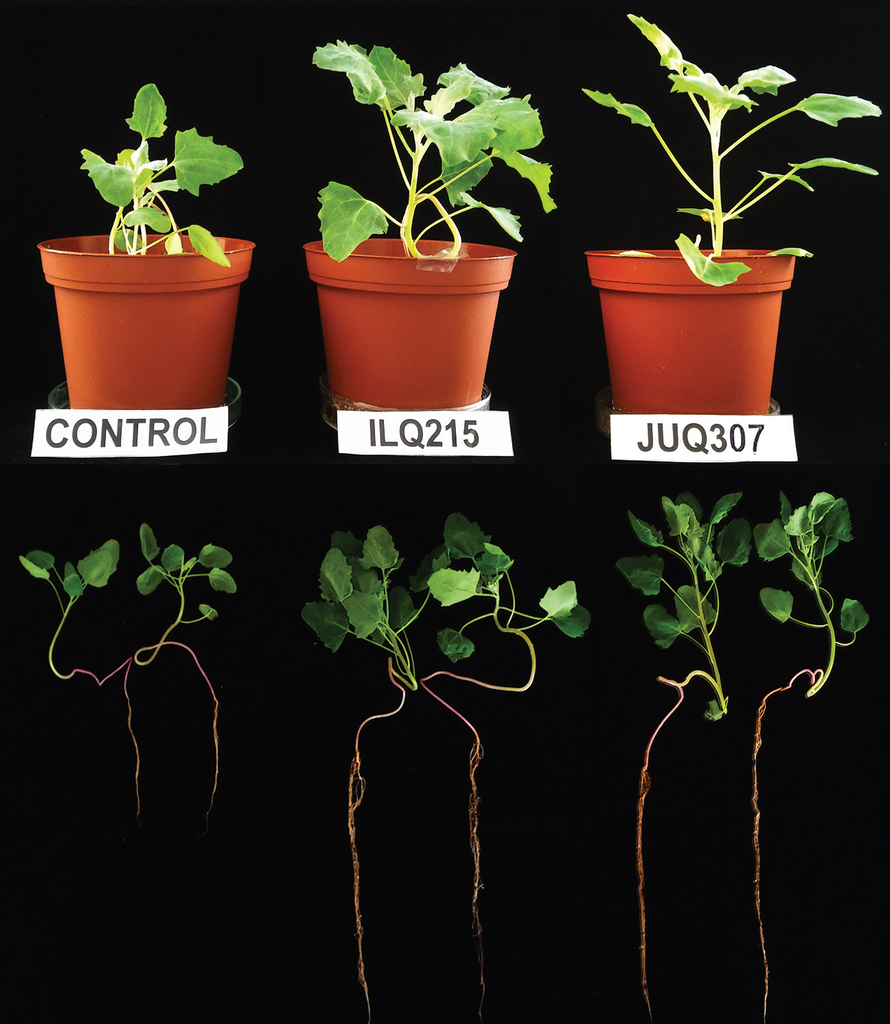Research
- Home >
- Technologies >
-
Bioprospection of native psychrotolerant plant-growth-promoting rhizobacteria fr ...

RESEARCH
Bioprospection of native psychrotolerant plant-growth-promoting rhizobacteria from Peruvian Andean Plateau soils associated with Chenopodium quinoa

La Molina

Status: Submitted
- Chenopodium quinoa
- Plant-growth-promoting
- rhizobacteria
- Psychrotolerant bacteria
Abstract
The Peruvian Andean Plateau, one of the main production areas of native varieties of Chenopodium quinoa, is exposed to abrupt decreases in environmental temperature, affecting crop production. Plant-growth-promoting rhizobacteria that tolerate low temperatures could be used as organic biofertilizers in this region. We aimed to bioprospect the native psychrotolerant bacteria of the quinoa rhizosphere in this region that show plant-growth-promoting traits. Fifty-one strains belonging to the quinoa rhizosphere were characterised; 73% of the total could grow at low temperatures (4, 6, and 15 °C), whose genetic diversity based on DNA amplification of interspersed repetitive elements (BOX) showed 12 different profiles. According to the 16S rRNA sequence, bacterial species belonging to the classes Beta- and Gammaproteobacteria were identified. Only three (6%) isolates identified as nonpathogenic bacteria exhibited plant-growth-promoting activities, like IAA production, phosphate solubilization, growth in a nitrogen-free medium, and ACC deaminase production at 6 and 15 °C. ILQ215 (Pseudomonas silesiensis) and JUQ307 (Pseudomonas plecoglossicida) strains showed significantly positive plant growth effects in aerial length (about 50%), radicular length (112% and 79%, respectively), and aerial and radicular mass (above 170% and 210%, respectively) of quinoa plants compared with the control without bacteria. These results indicate the potential of both psychrotolerant strains to be used as potential organic biofertilizers for quinoa in this region.
Résumé
Le plateau andin péruvien est l’une des principales zones de production de variétés indigènes de Chenopodium quinoa. Cette région est exposée à des chutes abruptes de la température ambiante qui affectent la production des cultures. Selon ce scénario, les rhizobactéries qui favorisent la croissance des plantes (RFCP) qui tolèrent de basses températures pourraient être utilisées comme biofertilisants organiques pour l’agriculture dans cette région. Les objectifs de cette étude consistaient à réaliser une bioprospection des bactéries indigènes psychrotolérantes de la rhizosphère du quinoa dans cette région qui présentent des caractéristiques favorisant la croissance des plantes. Cinquante et une souches appartenant à la rhizosphère du quinoa ont été caractérisées; 73 % du total étaient capables de croître à basse température (4, 6 et 15 °C), dont la diversité génétique basée sur l’amplification d’éléments répétitifs dispersés d’ADN (BOX) a montré 12 profils différents. Selon la séquence de l’ARNr 16S, des espèces bactériennes appartenant aux classes des bêta- et gamma-protéobactéries ont été identifiées. Seulement trois (6 %) de tous les isolats identifiés comme bactéries non pathogènes montraient des activités FCP comme la production d’AIA, la solubilisation du phosphate, la croissance dans un milieu sans azote et la production d’ACC désaminase aux températures testées (6 et 15 °C). Deux d’entre eux : ILQ215 (Pseudomonas silesiensis) et JUQ307 (Pseudomonas plecoglossicida) exerçaient un effet significativement positif sur la croissance des plantes quant à la longueur aérienne (environ 50 %) et radiculaire (112 et 79 % respectivement), et au poids aérien et radiculaire (plus de 170 % et 210 %, respectivement) des plants de quinoa, comparativement au témoin sans bactéries. Ces résultats indiquent le potentiel des deux souches psychrotolérantes à être utilisées comme biofertilisants organiques éventuels du quinoa dans cette région. [Traduit par la Rédaction]

To view more project details and submit an expression of interest
Explore more projects
Solutions to Business Technological Challenges
-
-
-
RESEARCH
08 Oct 2023
Dr. Guy Tanentzapf
Vancouver
- stem cells
- blood stem cells
- immune cells
- stem cell activation
